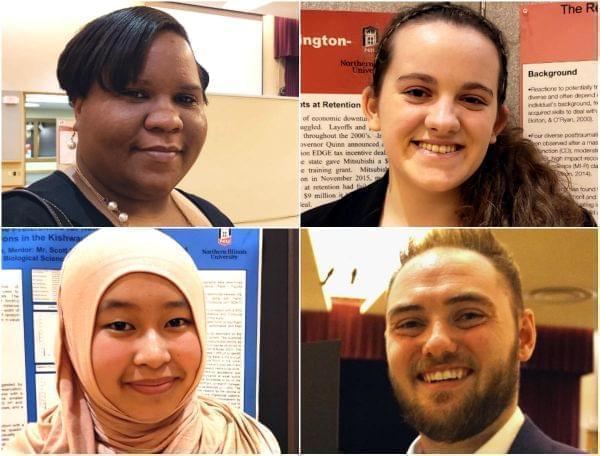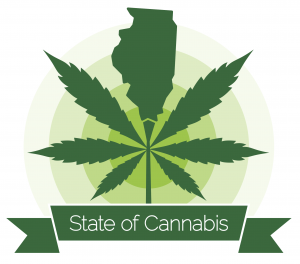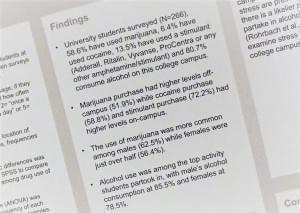Changing Attitudes Toward Cannabis

Tiffany Scott, Rachel Pollock, Mursyidah Syahirah, and Travis Paquin all shared their views on marijuana legalization. Susan Stephens/WNIJ
For decades, it was "marijuana" and conjured images of tie-dyed T-shirts and hemp hoodies. Now, it's "cannabis" and you're more likely to picture lab coats and business suits. Our series State of Cannabis continues with a look at the evolution of the public's attitudes.
It’s Undergraduate Research and Artistry Day at Northern Illinois University, a day when students show off their hard work at the end of the semester.

This story is part of a weeklong series from Illinois public radio stations focusing on the potential impact of marijuana legalization.
Travis Paquin, a senior in sociology at NIU, did his research on “the usage, obtainment, and selling practices on a university campus. And the drugs I focused on (were) marijuana, cocaine, Adderall and other stimulants, and alcohol consumption patterns.”
His survey of 266 NIU undergraduates showed more than 58% had used marijuana on campus, with more than half buying it off-campus. Use of cocaine and stimulants was much lower among those surveyed, but the vast majority said they had gotten those drugs on-campus. More than 80% used alcohol.
After spending a semester crunching the numbers, Paquin is hesitantly supportive of recreational cannabis legalization.
“I don't think it would be a huge problem on campus,” he said, “as long as people are using it safe and not letting it affect what they're really here for—that's getting the university education.”
Talking with others at the Research and Artistry Day event, some had strong opinions on whether recreational cannabis should be legal in Illinois—and those students tended to not want to give their names. One said he’s against legalization because he’s seen a lot of “non-productivity” from users, but he supports medical use because his parents both use cannabis-derived oil for arthritis. Two other students said they support legalization for economic reasons.

Trevor Paquin's research on drug use on campus, as displayed on NIU's "Poster Day.'
So does Danny Olan, majoring in both business and hospitality management.
"I do think that the things that could get done with the tax money outweigh the negatives of recreational marijuana use," he said.
Mursyidah Syahirah, visiting NIU from her school in Brunei, said she doesn’t think it should be legal because “when people take marijuana, they're not aware of their actions. And they may hurt other people.”
Rachel Pollock, a junior majoring in psychology, is still weighing the pros and cons of legalization. She said she’d like to see what it could do to alleviate prison crowding, but “I don't have very strong opinions on it. I don't use it personally. But I'm yeah, I'm still kind of doing research on it.”
Tiffany Scott’s son attends NIU. He stepped back when asked about legalization, but she was ready with an answer.
“I think it helps people with different things that they're dealing with in their lives,” Scott said. “It’s in a lot of states, so why not Illinois?”
WHY NOT ILLINOIS?
Eli McVey said, “The demand is already there. It's just transitioning that from the black market to a legal market. And I think that's why so many people see such big opportunity.”

Eli McVey
McVey is the research editor for Marijuana Business Daily. He’s based in Denver, but as a native of Atlanta, Illinois, a small town near Bloomington, he has a special interest in the debate over recreational cannabis in his home state.
McVey said the state’s Democrat-controlled House and Senate, “and a governor that made no qualms about his willingness to legalize recreational marijuana in the state, I think it has a real opportunity to do so. And, you know, I think that does go along with the shift in American attitudes.”
He said most people are open to the idea of a system of commercial marijuana sales that are taxed and regulated. McVey has analyzed years of national polling by Gallup and the Pew Research Center about attitudes toward marijuana. He said support for legalization has risen steadily over the years with a sharp increase recently. Overall, he found support is at 60% overall, although he found it unfortunate most of the polling didn’t distinguish between medical and recreational cannabis.
McVey said legalization has majority support in nearly every age group. Democrats and Independents tend to be more accepting, but nearly half who were polled who identify as Republicans now support legalization. He said the shift in attitudes is reminiscent of the evolving acceptance of same-sex marriage.
“We've seen support rise across political parties, religions, education levels, racial and ethnic groups, gender—they've all increased.”
WHAT'S DRIVING ATTITUDES TODAY
So why the change in attitude from the days of "Reefer Madness" and “Just Say No?” McVey said there are two major reasons driving mainstream acceptance.
First, there has been a shift in how the media portrays cannabis. He said in the 1980s and 90s, it was shown in the context of drug trafficking and abuse. In the late 2000s, the medical benefits were more likely to be the focus.
Second, McVey said there has been an interesting shift in American attitudes towards the criminal justice system. He said there’s a correlation between rising support for marijuana legalization and the percentage of Americans who think the criminal justice system is too harsh. He said that has made legalization a social justice issue.
OPPOSITION PERSISTS
But is America ready to welcome joints next to cigarette packs, marijuana edibles next to Twinkies, or THC vape cartridges at the liquor store? McVey said there will always be some who oppose legalization on moral grounds. But most of the opposition he has encountered has to do with traffic safety and use by teenagers.

Cannabis caramels.
McVey said research is still in its early stages on those two points.
“I think it was in a National Highway Transportation Safety Administration (report that) did find a small uptick in traffic accidents in states with recreational marijuana use,” he said. “Not fatalities, but accidents. But also, other studies by other governmental agencies have found a decrease in the (number) of teens using marijuana in states where it's recreationally legal. So I think those are the two primary reasons people object to this, as more of a public safety or a health concern. Other people, you know, they see it as a kind of a government endorsement of a drug.”
To McVey, Illinois has bigger hurdles than public opinion if it’s going to proceed with legalizing recreational marijuana. He said the lack of access to capital and banking are challenges for cannabis-based companies everywhere, especially for minority-owned businesses. He expects Illinois’ existing medical cannabis companies to be interested in moving into the recreational market, but there still won’t be enough product to meet demand. McVey said if Illinois lawmakers want to take full advantage of a cannabis-created revenue stream, they’ll have to license hundreds, if not thousands, of new businesses.
Links
- Cannabis Merges Into Health Care
- What Do We Know About Edible Cannabis?
- Can Cannabis Help Patients Avoid Opioids?
- Illinois Cannabis Programs Hampered By Federal Red Tape
- Update: Where Cannabis Legislation Stands
- State’s Attorney Prepares For Potential Changes In Marijuana Laws
- Small Illinois Towns Hope Legalized Marijuana Bring More Jobs
